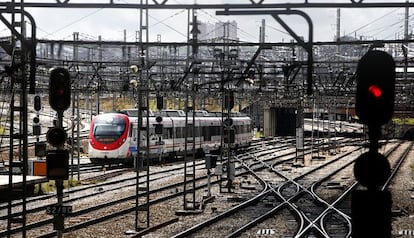First day of Spanish train strike unfolds without major incident
Workers call 46-hour stoppage on key vacation travel days to protest staff shortages


A train strike across Spain began an hour after midnight on Thursday and will extend to 11pm on Friday, threatening to affect thousands of people going away at the start of August or returning from their July vacations.
Worker unions have called the stoppage to protest the lack of personnel and privatization processes at Renfe and Adif, the railway operator and infrastructure manager, respectively.
The partial strike was expected to cause the cancellation of 513 trains covering long- and medium-distance routes.
But by Thursday afternoon no major build-ups or incidents had been reported, and many passengers appeared to be unaware of the strike entirely.
Renfe said that only 384 out of 9,000 workers had stopped, representing 4.29 percent of the workforce. Unions placed that figure at 50 to 80 percent.
The operator has guaranteed service for 77 percent of long-distance and high-speed trips and 65 percent of medium-distance trips. Commuter trains will run at 75 percent of their regular frequency during rush hour and 50 percent at other times.
The railway operator is also offering passengers a refund on their tickets or a seat on a different train.
The unions called the strike after talks with the Public Works Ministry broke down. “The ministry says that between now and 2018, high-speed passenger volume will double from 26 to 50 million,” said Manuel Nicolás Taguas, of the CCOO union. “But instead of increasing our staff, they tell us that we need to reduce it.”
Taguas also lamented the policy of outsourcing and the “forced mobility” to which workers are subjected.
“This is not about money,” added José Luis Esparcia of CCOO. “We are striking because the service is deteriorating through lack of personnel. We demand a viability plan that will guarantee quality and safety for users.”
Tu suscripción se está usando en otro dispositivo
¿Quieres añadir otro usuario a tu suscripción?
Si continúas leyendo en este dispositivo, no se podrá leer en el otro.
FlechaTu suscripción se está usando en otro dispositivo y solo puedes acceder a EL PAÍS desde un dispositivo a la vez.
Si quieres compartir tu cuenta, cambia tu suscripción a la modalidad Premium, así podrás añadir otro usuario. Cada uno accederá con su propia cuenta de email, lo que os permitirá personalizar vuestra experiencia en EL PAÍS.
¿Tienes una suscripción de empresa? Accede aquí para contratar más cuentas.
En el caso de no saber quién está usando tu cuenta, te recomendamos cambiar tu contraseña aquí.
Si decides continuar compartiendo tu cuenta, este mensaje se mostrará en tu dispositivo y en el de la otra persona que está usando tu cuenta de forma indefinida, afectando a tu experiencia de lectura. Puedes consultar aquí los términos y condiciones de la suscripción digital.








































